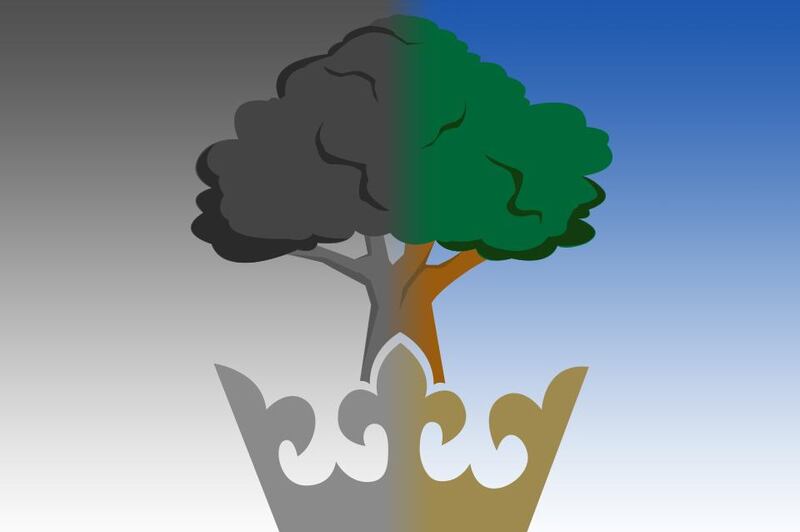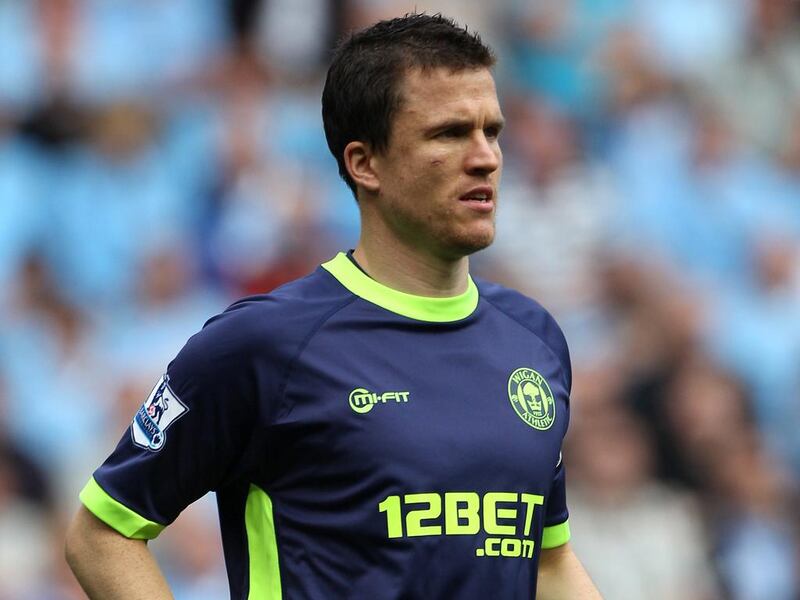Pictures line the walls of the corridors of the DW Stadium. Some in reception show the most famous day of Wigan Athletic’s history, when Ben Watson secured them the FA Cup in 2013.
Others take a trip further back in time. There is owner Dave Whelan with Sir Alex Ferguson when Manchester United helped open the ground in 1999.
There is a montage of images from Wigan’s 46 years in non-league before, in 1978, they were eventually elected to join the Football League. Another shows the youth-team graduates who progressed to play senior football, a teenaged Leighton Baines among them.
Then there are more recent snapshots of happier days. One shows Gary Caldwell applauding the travelling Wigan fans at Liverpool’s Anfield ground after he scored the winner there in 2012.
David Sharpe posted the same picture on Twitter last week, marking the fourth anniversary and circling a figure in the background. High among the travelling fans, cheering Caldwell on, it was him.
Sharpe was a 20-year-old follower then. Now, at 24, he is the youngest chairman in the Football League. Caldwell was Wigan’s captain and player of the year then. Now, at 33, he ranks among its youngest managers. They have a combined age of 57.
More Sporting reads
• Wael Al Qadi mapping out his plans to make Bristol Rovers a force
• Bolton, big stars, bigger fall and the dark side of the EPL dream
They are fresh-faced figures who have come to symbolise how Wigan’s renewal has come from within. Their story seemed to have come full circle, from obscurity to the top flight back to obscurity.
This was the rise and fall of a small club who entered the Premier League in 2005, stayed there for eight seasons, won major silverware in utterly unexpected fashion but suffered two relegations in three seasons. Now Wigan, having hit rock bottom, are rebounding, undefeated in 2016 and on course for promotion from League One.
“We are still a million miles away from where we want to be as a football club,” cautioned Caldwell. Yet they have come a long way.
Monday’s 1-0 win over Rochdale extended their unbeaten run to 18 matches and took them six points clear of third-placed Walsall, although the Saddlers have two games in hand.
Sharpe, sat in the directors’ box a couple of seats from his grandfather, Whelan, is headed for promotion at the first time of asking. His pre-season prediction they would get 100 points has become mathematically impossible, but he has got much else right, not least his choice of manager.
Caldwell a smartly-dressed figure on the edge of his technical area, looking almost military in his bearing and briefing his players with instructions on paper, is the rookie who is building something from the rubble of a sorry season.
Wigan’s collapse was chastening. “I remember seeing the team last season on paper and they were one of my early predictions to get promoted,” said Sam Morsy, then a Chesterfield player and now a cornerstone of Caldwell’s midfield. Instead, Wigan went down, prompting them to turn to a former captain.
Managers with a greater pedigree had overseen a decline. Uwe Rosler at least started well before a wretched run of form cost him his job. His predecessor Owen Coyle was a disappointment, his successor Malky Mackay a disappointment.
The move for Mackay, who was under investigation by the English Football Association for allegedly sending racist, sexist and homophobic tweets, seemed an opportunistic attempt to acquire a talented but tarnished manager.
It backfired. Results under the Scot were awful while Whelan, in an interview defending his decision to hire Mackay, made comments the FA deemed racist, leading to him serving a six-week suspension from football and then handing over the chairmanship to Sharpe.
The sense was that a club had lost both its way and its moral compass. They have turned to their own and re-established a bond with their public. They took more than 2,000 fans to Crewe in January and, if that is one of the shorter journeys in League One, 1,309 followed them on a lengthier trip to Swindon on Friday. They won 4-1. “The whole club has worked extremely hard to get back in a position where the fans can be proud of what they see on the pitch,” Caldwell said. There is a more relaxed air, which stems in part from Sharpe. Helped by slipping out of the limelight and into League One, Wigan no longer feel in the eye of a storm. Their problems were broadcast; their renaissance has gone under the radar.
Caldwell has brought focus. “There is an air of authority about him,” said Morsy. “Sometimes when you are playing, people around you know you are going to be a manager and that was the case with him. He is doing a fantastic job.”
His midfield sidekick David Perkins added: “The food’s right, the cooldown’s right, the videos are right. He tells us exactly what he wants from us so there’s no stone unturned.” Caldwell has been a continuity candidate who has brought change, in Wigan’s fortunes and the personnel on the pitch.
The firesale had begun even before relegation was ratified. The Scot made a conscious decision to get rid of most of the players who were his former teammates. None of the current squad played for Wigan in the Premier League.
Also see
• Find all of The National Sport's long reads in one place
Only two were Coyle signings and one of those, defender Leon Barnett, cannot get in the team. In their place, there has been an influx.
Caldwell has made 20 permanent signings. Loanees have brought this season’s total of debutants up to a startling 27. Rather than scattergun spending, he has shown a decisiveness.
“The gaffer did his business early doors,” said Perkins, his first recruit. “He got his players in and said how he wanted to play.”
Perkins and Morsy are two who have lent knowledge of League One. So has striker Will Grigg scored 22 times in MK Dons’ promotion campaign last year and has chipped in with a further 20 goals for Wigan.
Their facilities and recent history give them a rare allure at this level. “It is club that wants to get back to the top,” said Morsy. “The chairman, the players and the manager are all ambitious.”
But, as Rochdale manager Keith Hill argued, Wigan’s appeal does not just lie in aspiration. “They have a Championship budget,” he said. “They spend more on one player than we do on our entire budget. They should be walking this league.”
Wigan’s slump was so swift that they are a League One club who receive parachute payments because of their relegation from the Premier League. If it creates an unfair playing field for Hill, it means they can afford to borrow Stephen Warnock, a member of England’s 2010 World Cup squad and one who looks a class above third-tier opponents, and sign Jussi Jaaskelainen, a veteran of 14 Premier League campaigns.
The goalkeeper, who turns 41 in April, is seven years older than his manager. He has also kept seven clean sheets in his last 11 games.
Wigan’s season has gathered momentum in the process. They were tenth in October. “The slow start was new players integrating into a new club,” Caldwell said. “That is never easy and we had a massive turnover.” Once they gelled, they brought a stark reversal in form. At this stage of last season, Wigan were in the final weeks of an 18-game, seven-and-a-half month wait for a league win at the DW.
Twelve months on, victory over Rochdale gave them the division’s best home record.
Their horizons have narrowed, their opponents changed. Two years ago, a maiden continental campaign took them to Kazan, the capital of Tatarstan, which lies 450 miles east of Moscow.
Now the unfamiliar locations are rather more local: Wigan and Rochdale are both in Greater Manchester but, until November, they had not met since 1999.
The minnows adopted unconventional tactics in their bid to halt Wigan. Hill played with wide forwards, but no actual centre-forward. Instead, midfielder Donal McDermott was deployed as a false nine.
Rochdale were compact, clever and defensively disciplined. For half an hour, their plan worked well. Then it required a rethink. Wigan’s Jason Pearce committed a late tackle on Rochdale captain Ian Henderson, who responded by kicking out.
The Athletic defender saw yellow, the Dale forward red. The 10 men could not accommodate a false nine. McDermott took over Henderson’s duties on the right.
Meticulous in his preparation, Caldwell proved flexible in his thinking. He reacted by changing shape, deciding he no longer needed a back four. Centre-back Pearce made way for the more progressive Haris Vuckic.
Caldwell’s changes worked. Another catalytic substitute, on-loan Everton forward Conor McAleny bundled the ball over the line after Yanic Wildschut’s shot was deflected on to the bar and his attempt to convert the rebound was thwarted by goalkeeper Josh Lillis. “The scruffiest goal you are ever likely to see in football,” said Hill. Roles were reversed thereafter. Wigan withstood Rochdale’s late assault, while failing to add a second goal on the counter-attack. “We had to show character,” said Caldwell.
He attributes the turnaround to that essential ingredient, hard work. The surroundings reflect different sorts of industry. The advertising hoardings are used to publicise the sort of Wigan businesses who were priced out of such spots in their Premier League days.
They promoted local radio stations, a crane-hire company, a carpet warehouse and a couple of estate agents. And, inevitably, pies, which were associated with Wigan long before football was.
While last season was toxic, now the man-of-the-match award, which was given to Warnock, is sponsored by an asbestos removal firm. Wigan have been cleansed and reinvigorated.
Nothing they achieve will be as memorable as the FA Cup victory, or indeed the 2012 Caldwell-inspired run of seven victories in nine games to fashion one of the Premier League’s great escapes from relegation, but there may soon be new photographs to decorate the DW Stadium.
sports@thenational.ae
Follow us on Twitter @NatSportUAE
Like us on Facebook at facebook.com/TheNationalSport







